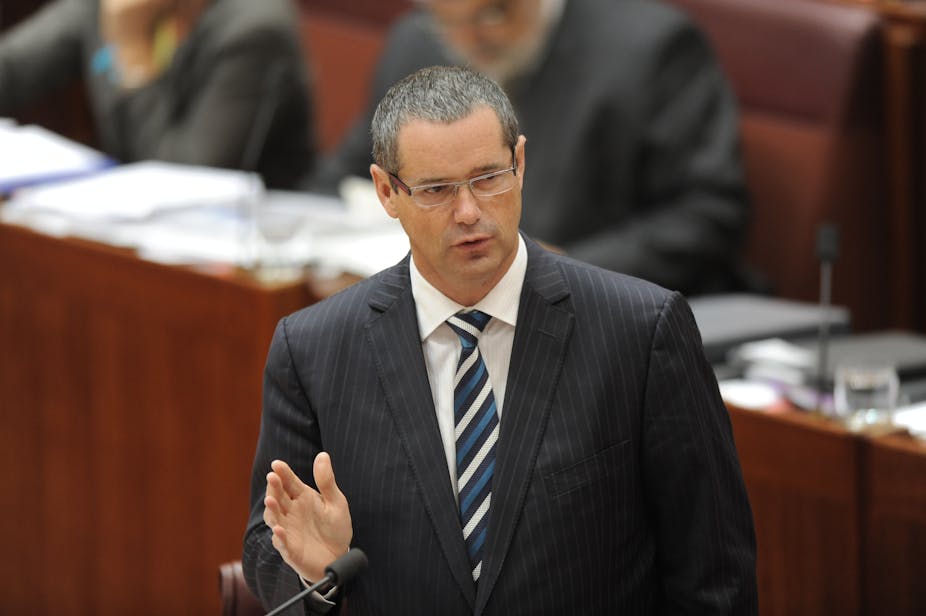It might not be a front line issue, but media policy is a significant election year debate.
Communications Minister Stephen Conroy is still committed to bringing a submission to cabinet in coming weeks or months, despite a long delay caused by differences within the government between those who would like a robust approach following the Finkelstein Inquiry and others, including the Prime Minister, who do not want to upset the media companies.
The debate has also been heightened by the cost cutting and staff shedding by the major media organisations, Fairfax and News Limited, and by the imminent entry of The Guardian into the Australian market.
This week Professor Robert Picard, from the Reuters Institute for the Study of Journalism at the University of Oxford, gave a grim assessment of the difficulty for the public of obtaining quality information in the age of information overload.
“We are receiving more information than ever before, but it is a narrow form of information. We get endless flow of events news, disaggregated facts, and massive amounts of sports and entertainment news. These are increasingly shortened and disconnected from other information to limit complexity and allow quicker consumption. This information is replicated and echoed through multiple digital sources—magnifying its availability,” he told the National Press Club in Canberra.
“This expanding information hides the diminishing focus on complex social issues and challenges, the reduction in oversight and pursuit of accountability of social institutions, and an impoverishment of in-depth reporting and analysis.”
“These are occurring because changes in technology and economics are dismantling the traditional financial configurations that made Western media independent and provided the resources needed to carry out regular coverage of social institutions and undertake expensive and time consuming investigations,” Professor Picard said.
Digitalisation had destabilised the business models, he said, with digital developments concurrently stripping wealth from the news industry, forcing newspapers and other news operations to become smaller, reducing news bureaus and staff.
“The digital world is thus producing a paradox in which news and information sources and distribution platforms are increasing, but the capacity of news organisations to provide quality news is diminishing,” he said.
The media had become more dependent on the market and this had rendered them all highly vulnerable to commercialism, vying for larger, more attractive market segments.
“As a result media accentuate competition, manufacture conflict, and create false excitement in a desperate bid to attract audiences. Dialogue has become shouting matches, observation of the human condition has become voyeurism, and even cooking has become competition. Media celebrate mediocrity and folly; give great attention to unaccomplished and mindless individuals; and venerate the common and the mundane,” he said.
“The market pressures are reducing journalistic quality, producing practices that diminish the social value of news content, and diverting the attention of journalists from social activities to those primarily related to the business interests of the enterprises.”
These trends had led to debate about whether public action should be taken and if so what sort of action, including increased regulation, support and incentives to improve content.
Picard canvassed a range of actions that had been taken overseas and the pros and cons of various types of intervention, he also noted that it was not just a case of whether governments should or should not do but said that society should also encourage non-government support for quality news.
“The challenges facing quality news provision are complex and there will be no single easy solution, but it is vital that society address the growing gulf between our aspirations for information society and the information that it is actually providing,” he said.
“As we look forward, the most important issue is not whether traditional news providers survive, but how news will be gathered and distributed in the coming century. The issue involves questions about what institutional and organizational arrangements will emerge to support newsgathering, curating, and analysis. Distribution of news is no longer the challenge, but the business arrangements surrounding it clearly are in question.”
He said it had become increasingly clear that “markets are highly useful for providing some types of information and content, but that they are not able to fully meet the information needs of democratic society.”
Picard did not delve particularly into Australian examples. But here, the situation is complicated by the fact that tax payers already fund a major media player, the ABC, making the advocacy of money to support other news gathering operations more difficult. The ABC itself periodically becomes a political issue, with both sides at times complaining about its coverage. If there is a coalition government elected this year, the national broadcaster could find itself under funding pressure.
Meanwhile, the Gillard government is likely to tread softly on the issue of standards for the newspaper industry. The real test of its media policy will be whether it maintains Labor’s support for a public interest test on the sale of media assets to be introduced, to prevent even further concentration of an already highly concentrated industry.

